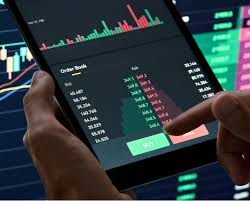Understanding Crypto Trading Platforms A Complete Guide

Understanding Crypto Trading Platforms: A Complete Guide
The world of cryptocurrency trading has seen exponential growth in the past few years, with numerous platforms emerging to meet the needs of traders around the globe. In this article, we will explore various aspects of Crypto Trading Platforms http://ceimsa.org/archives/bull-1025.htm, including their features, benefits, and how to choose the right one for your trading strategy.
What are Crypto Trading Platforms?
Crypto trading platforms are online services or applications that allow individuals to trade cryptocurrencies. These platforms provide a marketplace for buyers and sellers to interact, facilitating the exchange of digital assets. With the rise of blockchain technology and cryptocurrencies like Bitcoin, Ethereum, and many others, these platforms have become crucial for anyone looking to invest or trade in the crypto space.
Types of Crypto Trading Platforms
There are several types of crypto trading platforms, each catering to different needs and preferences. Here are the most common types:
- Centralized Exchanges (CEXs): These are platforms where trades are facilitated by a centralized authority. Users deposit their funds onto the exchange, which then executes trades on their behalf. Examples include Binance, Coinbase, and Kraken.
- Decentralized Exchanges (DEXs): Unlike CEXs, DEXs allow users to trade directly with one another without the need for an intermediary. This promotes greater privacy and control over funds. Examples include Uniswap and SushiSwap.
- P2P Trading Platforms: These platforms connect buyers and sellers directly, allowing them to negotiate prices. Users can trade cryptocurrencies for local currencies or other digital assets. LocalBitcoins and Paxful are popular P2P platforms.
- Brokerage Platforms: These platforms act as intermediaries between buyers and sellers. They typically offer a user-friendly interface and simplified trading processes. Examples include eToro and Robinhood.

Key Features of Crypto Trading Platforms
When choosing a crypto trading platform, it is essential to consider several key features that can impact your trading experience. Here are some of the most critical features to look for:
- User Interface: A user-friendly interface is crucial for both beginners and experienced traders. Look for platforms that offer intuitive navigation, charting tools, and easy access to trading pairs.
- Security Measures: Security should be a top priority when selecting a trading platform. Look for features such as two-factor authentication (2FA), cold storage for funds, and insurance policies to protect against hacks.
- Trading Fees: Different platforms have varying fee structures, including trading fees, withdrawal fees, and deposit fees. It’s essential to choose a platform that offers competitive rates without hidden costs.
- Customer Support: Reliable customer support is crucial, especially for new traders who may encounter challenges. Look for platforms that offer multiple support channels, such as live chat, email, and phone support.
- Variety of Cryptocurrencies: A diverse range of cryptocurrencies is essential for traders looking to explore various opportunities. Ensure the platform lists the coins you wish to trade.
Pros and Cons of Using Crypto Trading Platforms
Like any other financial tool, crypto trading platforms come with their advantages and disadvantages. Here are some pros and cons to consider:
Pros:
- Accessibility: Most platforms are accessible from anywhere with an internet connection, making it easy to trade on the go.
- Variety of Tools: Many platforms offer trading tools, educational resources, and market analysis to help users make informed decisions.
- Liquidity: Centralized exchanges typically have higher liquidity, meaning users can buy and sell their assets more quickly.
Cons:

- Security Risks: Centralized platforms are vulnerable to hacking and fraud, making security a critical issue for traders.
- Central Control: CEXs and brokers have control over users’ funds and may restrict access in certain situations.
- Fees: Some platforms have high transaction and withdrawal fees that can eat into profits.
Choosing the Right Crypto Trading Platform
Selecting the right crypto trading platform requires careful consideration of your needs as a trader. Here are some tips to help you choose the right platform:
- Assess Your Trading Style: Determine whether you are a long-term investor, a day trader, or a swing trader. Each trading style may require different platform features.
- Research and Compare: Take the time to research multiple platforms, comparing their features, fees, and user reviews before making a decision.
- Start Small: If you are new to trading, consider starting with smaller amounts to get a feel for the platform and its features.
Regulation and Compliance
Regulatory frameworks for crypto trading platforms vary by country and region. Some countries have embraced cryptocurrency trading and implemented policies to protect investors, while others have imposed strict regulations or banned trading altogether. It is essential to understand the legal landscape in your jurisdiction and ensure that the platform you choose complies with local laws and regulations.
Conclusion
The rise of cryptocurrency trading has brought about a plethora of platforms that cater to both novice and experienced traders. By understanding the different types of platforms, their key features, and the associated risks, you can make informed decisions that align with your trading goals. Remember to conduct thorough research and choose a platform that meets your specific needs while ensuring your funds’ security. As the crypto market continues to evolve, staying informed and adaptable will be crucial for success in this dynamic trading environment.
